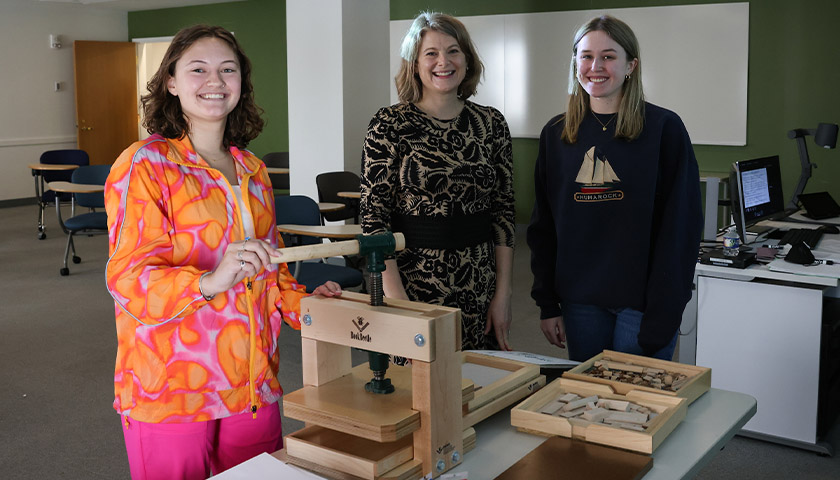The Power of the Printed Word

Maddie Stanley, Class of 2026, walks to the front of her English classroom—and takes a step back in history.
Under the watchful eyes of her classmates, she leans over a BookBeetle portable printing press, a small-scale replica of those used in Europe between the 15th and early 19th centuries. In her right hand, she holds a paint roller covered with blue and yellow ink. She carefully spreads the ink across rows of letters that together form the third line of Shakespeare’s Sonnet 18—“Rough winds do shake the darling buds of May”—and then prints out a copy.
“That was fun!” she says, rubbing away spots of ink from her hands. “As English literature majors, we never get our hands dirty.”
Until now. This is the first semester that Professor Hannah Hudson has made the press part of her English 213 course, which introduces students to British literature from the Middle Ages to the 18th century.
“We cover nearly 1,000 years of history, so there is a lot to learn,” says Hudson, whose purchase of the printing press was made possible when she received both an M.C. Lang Fellowship from the Rare Book School and an experiential learning micro-grant from Suffolk. After studying how manuscripts were produced and circulated in the medieval period, students learn how the printing press helped make the mass distribution of books possible, transforming society and ushering in the modern era.
In the computer age, Hudson says, “students don’t understand how printing presses work. I wanted them to see one and practice the skill of printing themselves.” She also wants them to have some fun. “My philosophy,” she says, “is that students learn best when they are excited and engaged.”
Increasing access to literature
Working in groups of three, students choose how to lay out the words from different lines of one of Shakespeare’s best-known sonnets (“Shall I Compare Thee to a Summer’s Day?”) on a single page. They select the color ink they want to use, set and lock up the type, and make the prints.
“This helped me fully understand the impact that the press had over the years,” says Stanley, whose two career interests—law and journalism— were both transformed by the press’s invention. “Going through the process of making the prints showed me the big picture.”
“It makes you appreciate the value of accessibility when it comes to literature,” adds Matilyn Paul, Class of 2026. “Before the printing press was invented, everything had to be handwritten. The press allowed a wider audience of people to experience reading.”
Besides, adds Paul, who hopes to one day follow in her professor’s footsteps, “If the printing press didn’t exist, I wouldn’t be here today studying to get my English lit degree.”



